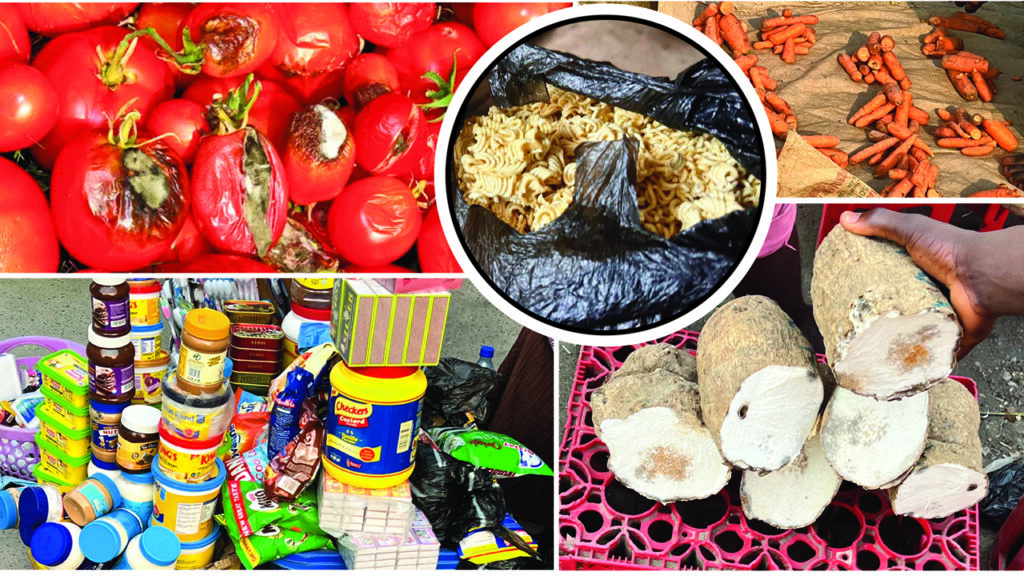
The economic downturn occasioned by galloping inflation has pushed more Nigerians down the poverty line, and basic diets are now less affordable in most families. In major cities like Lagos, and in the face of the abysmal slow roll-out of government interventions, beleaguered residents are resorting to extreme measures of patronising expired product markets for unfit staples that erstwhile belonged to privileged domestic animals, BERTRAM NWANNEKANMA, TOBI AWODIPE and ENIOLA DANIEL report.
Nigerians live in desperate times and like Williams Shakespeare once wrote: ‘Desperate times breed desperate measures.’ That is aptly true of the mood in many Nigerian families that are now forced to make difficult choices – either to sacrifice essential needs to cope with the rising prices of goods or die of hunger soon.
Of the former, more choices abound. Either to spend all on less diet or fewer resources on more in the mode of ‘condemned’ and expired items, which include pepper, yam tubers, fruits, proteins, noodles, milk and other groceries.
Though the sale of remnants, repackaged and expired products is not new in Lagos markets, the demand is soaring at a disturbing proportion.
Growing demand for condemned, mashy staple
A visit to the popular markets in Mile 2, Oshodi, Mushin, and Oke-Odo in Lagos revealed that rotten tomatoes and pepper, popularly known as esha (mashy), have become the preferred choice for their comparative affordability.
Unhealthy-looking carrots, and close to rotten, were piled up and sold for N100 per heap. At the tomato market, the fresh tomatoes lacked customers while many crowded the mashy baskets.
A big bowl of esha went for between N2,000-N2,500 while the small bowl sold for N1,500. In contrast, a small basket of fresh tomatoes went for N6,500. A few months ago, the big basket of tomatoes was sold for less than N10,000. Now, it is over N20,000.
A big bowl of damaged onions also went for N1,000 while the fresh ones were sold for N6,000. Just like with the tomatoes, the mashy onions saw many customers with the traders encouraging people to buy and grind it immediately. “When you grind it with pepper, there is no difference from the fresh ones,” a bystander offered.
“In the past, N2,000 worth of pepper was enough to take us for two weeks. Now, it is not even enough to cook a pot of stew. When I boil the esha and add a lot of onions, it would be fine to eat. Meat and fish that I will use to cook the stew is now out of reach,” a mother of three, Bose Abike told The Guardian, adding that she now buys a little meat and supplements it with ‘biscuit’ bones.
Biscuit bones, that is, remnants of butchery, traditionally belong to pet animals. Now, Nigerians have started craving it as a ready source of protein, and a substitute for the high cost of meat, fish and egg protein.
The ‘biscuits’ are sold in small heaps, usually in the evening after the main meat has been sold off. Abike said one heap of the soft bones used to sell for ₦500 but has now gone up to ₦1500.
“Even the ‘biscuit’ we are managing has become very expensive. What we used to buy for N500 is slowly going out of reach now. The meat is now for my husband and sometimes for myself, while the children eat the ‘biscuit’. When there is no money, we don’t even eat anything.”
Another resident revealed that broken yams were her go-to as they are far cheaper than whole yam tubers and potatoes.
“When yams became very expensive, we switched to potatoes but now, potatoes too are beyond reach. So, I went to the market to buy those tubers that got broken in transit. If I do not see those, I would buy water yam as an alternative if it is affordable. If not, no yam on the menu.”
A food vendor said she has resorted to buying esha to make room for a small margin of profit. “If you buy the fresh ones, you will run at a loss. Everything is so expensive and when you factor in other things, you will see that you are making a loss. The fresh ones are better, but I cannot afford it,” she said.
More findings by The Guardian revealed that fish heads and guts are now up for sale in major markets. Fish traders explained that customers in the past often dispensed with the fish heads as waste. Now, where still available, the fish heads are sought by many who cannot afford a whole fish.
Speaking with a fishmonger at the Mushin market, Iya Barakat, she said sales have been very poor since the beginning of the year. Lamenting that a carton of Ojuyobo fish, which is very popular among food vendors, moved from N32,000 to almost N60,000. She said many have stopped buying it and started eating fingerlings. Fingerlings, she said, are cheaper but are not very good for consumption.
“Things are going from bad to worse,” she said. “In the past, we used to sell over 10 cartons in a day. Gradually, it dropped to five and now, we don’t even finish one carton in a day. People are asking for fingerlings and fish heads. When nobody is buying fish, how would we have heads to sell?” she queried.
Everything expiring, expired markets
The packaged food market is not better. Bags of semovita that have been infected with weevils are no longer thrown away in the marketplace. Now, they find willing buyers. They are now displayed in smaller nylons and sold to consumers at rebate rates. A salesgirl at Lomily Ventures in Oshodi, Sola Adeyemi, said before, they used to either take home or trash Semo flour that is infected with weevils.
“Many people now come to ask for that because how many can afford to buy the bags? Some people sieve out the insects when they buy, others eat it like that,” she revealed. Baby milk and formula are also another casualty of the worsening economy. Many families cannot afford to buy baby formula again as the price keeps going up.
Blessing Moses, a mother of one, told The Guardian that sometimes, she waits for supermarkets to put up close to expiring or expired baby formula on their discount shelves before she can buy. “If I wait for some time and I am not lucky to get any, I will settle for a millet and corn combination meal.”
Unfortunately for the young mother, the price of both has gone through the roof, forcing her to look for alternatives. The alternative is Semo flour, mixed in warm water with a little milk added. “I know this is not the best for a baby, but have you seen the price of baby milk? And it is getting more and more expensive every day,” she lamented.
When asked if it is okay to sell close to or expired items, a manager of a popular supermarket located on the Ire-Akari Estate Road, said buyers are aware of what they are buying.
“An item of N1,500-N2,000 may be sold for between N500-N1,000 on the discounted shelf. You may say it is expired but something that has just expired is not really bad and can still be consumed,” he said. He added that they do not intend to sell expired items, but circumstances force them to, as they do not want to completely lose out.
“There is very little profit being made on these items and throwing them away will eat into our capital. People approach us all the time asking if we have things that are close to expiring, damaged or defective and we sell them at a lesser price. Everyone wants something new and good, but it is the situation of things that is making many people go for these defective items. If prices of food and provisions continue to skyrocket, people will always look for cheaper alternatives,” he said.
A ready-made market, demand for substandard
Findings showed that a good number of items sold by roadside vendors in one of Lagos’ biggest markets, the Lagos Island Market, are either fake, expired or close to expiry. From Balogun to Oke-Arin and Idumota, substandard and close to expired-items are being hawked openly and bought by many.
From the foot of the pedestrian bridge to the end of Idumota, roadside vendors are seen hawking Happy Hour juice for N400/litre. The drinks were labelled to expire at the end of February 2024. A pack of 65 grams of Dettol soap is on sale for just N1,000 while Ariel Machine wash 400g goes for N500. The detergent had expired in January but almost all the vendors were selling it.
A trader said there was nothing wrong with the products despite the expiration. She said that wholesale traders gave them to the market when they realised that the items were close to expiring.
Oke-Arin in Lagos Island is rife with repackaged items, with some traders going ahead to sell the expired items. A trader, Blessing, who was seen selling provisions and everyday items by the roadside, said the people buying from them are much aware that the items are expired or close to expiring.
“They know it is expired, that is why it is cheaper than normal. Where else can you see powdered milk refill for N1,000 or do you want to steal it? The ones that have not expired are far more expensive and we all know it. All the things here (pointing to her goods) are almost expired, some have expired and that is why we reduced the price,” she said.
At the Mile 12 market, which prides itself as the biggest market for all perishable food items in the Centre of Excellence, Lagos, is another beehive of expired and condemned goods.
A visit by The Guardian to different sections of the market revealed that while whole food items are sold, most people go for cheaper, and defective food items.
Expired noodles are removed from their packs and tied in nylons to sell at a cheaper rate, while other sellers after removing them from the nylon, empty the product in bags and sell per bowl. While a sachet of noodles goes for N150, two of the expired sachets sell for N100.
Before now, the expired noodles were sold or given for free to feed pigs or blended to be converted to chicken feed. When approached, buyers said the expired products don’t kill if well cooked. The sellers also claimed that companies do not accept expired goods, and the reason they have to remove the products from the sachets and repackage them.
When The Guardian called a noodle manufacturing firm, it claimed that it accepts the return of expired goods but comes with conditions. “We do not encourage the sales of expired goods and we will look into this to ensure such practice is stopped,” he added.
While expired cornflakes are removed from their cartons, put in bags and displayed for sale, noodles are kept away from prying eyes in the market.
When The Guardian visited the market, a four-litre bucket of expired noodles sold for between N2,500 and N3,000.
A food vendor in Mowe market, Obafemi-Owode Local Council of Ogun State, said many people are now buying condemned cereals for their families believing that when it is well heated it will not be poisonous, hence the hike in price.
The vendor, Ogbonna, said even the chaff from beans, a staple for goats and cows, is now a hot cake because of the high cost of beans, which ranges between N4,000 and N5,000.
According to him, a little sack of condemned noodles now goes for N4,000 as against N2,000 because they are mixed with crayfish. “There is no more condemned or wasted food for animals now, humans need to feed,” he said.
A veterinary doctor, who owns a pet shop along Ofada Road, Mowe, Michael Omoniyi, said he is out of stock and could not restock as “even the companies are no longer releasing the products”.
“I had a large stock, but they are now gone because of huge patronage. I have sent for supplies but there is none available from my source. I was told that many people are now consuming condemned foods, which is why it is scarce. This is dangerous and the government must intervene as people must feed to ensure that there is no revolution,” he added.
Caveat emptor!
Indeed, the rising cost of living in Nigeria has placed an unbearable burden on citizens. Necessities such as food, housing and healthcare have become increasingly unaffordable, pushing many households to the brink of extreme poverty.
Before the recent hardship experienced in the country, Nigeria had 133 million multidimensional poor population living on unhealthy diets. That is contrary to warnings by health practitioners and regulators. Condemned food means any food or other edible matter that has been deemed unfit for human consumption under the Food Safety Act and that does not contain Free Liquids. According to nutritionists, such food that is derived from animals or that contains products of animal origin is removed from the food chain when they are no longer fit for human consumption.
Once a food is condemned for the above reasons, it is classified as a waste product. To safeguard public health, the condemned foods are permanently removed from circulation and in some cases classified as a waste animal by-product.
In some cases, companies donate them to charities before their expiration dates, while some condemned foods like noodles, and sachet milks are used as meals for poultry, pigs, dogs and other pets. However, the recent food crisis and the quest for cheaper products have attracted many families to them.
The National Agency for Food and Drug Administration and Control (NAFDAC) advises against consuming expired foods and condemned foods not fit for human consumption, warning that it is dangerous to the liver and kidneys.
No longer at ease
The government is also not living in denial of the high cost of living and excruciating hardship in the land. While Nigeria’s annual inflation rate nears 30 per cent, the country’s food inflation rate as of January 2024 is 35.41 per cent, and more than double on the streets.
According to a report from Trading Economics shared by Statisense on its X handle, Nigeria tops the list of eight African countries sampled in the food inflation rate report.
Ghana comes next to Nigeria with 27.1 per cent inflation rate while Cameroon has 10.8 per cent. Benin Republic follows with 5.5 per cent, while Ivory Coast has 4.5 per cent, and Mali, Togo and Chad have 1.1 per cent.
Although the official records from the National Bureau of Statistics (NBS) put the nation’s food inflation rate at 35.41 per cent, the reality of the food inflation rate on the street is between 50 and 100 per cent, considering the scale of the hike in food prices in less than two months.
As Nigeria’s economic and current food crisis hit a boiling point, citizens this week expressed their frustration over soaring inflation and the spiralling cost of food by hitting the streets of major cities and calling on the government to “end hardship now!”
The protests kicked off on Monday in some states and were expanded to a nationwide demonstration on Tuesday after the Nigeria Labour Congress (NLC) called out workers to come out to the streets. ‘’There is suffering in the land, there is suffering for the workers, no worker can live on N30,000 ($18.40) minimum wage and over 150 million Nigerians are living below the poverty line,” NLC president, Joe Ajaero, lamented.
With more Nigerians being pushed into poverty daily, it has become a struggle beyond the survival of the fittest to attain the basest of Maslow’s hierarchy of needs. According to the American psychologist, Abraham Maslow, the most essential human needs are the ones that keep us alive, like food, water, shelter and air.
Without this basic level of survival, a person can’t be expected to do much in the way of higher thinking or achievement. “A person who is lacking food, safety, love, and esteem would most probably hunger for food more strongly than for anything else,” Maslow explained in his 1943 paper ‘A Theory of Human Needs. Everything else, he posited, has to come after.
This explains the tragedy that occurred last weekend when the Nigeria Customs Service (NCS), in response to cushion the suffering of citizens, began the sale of seized bags of rice to the public at the rate of N10,000 per 25kg, which has a going market value of N40,000. The NCS was forced to suspend the exercise after a stampede killed seven persons at the NCS Old Zonal Headquarters in the Yaba area of Lagos on the first day of the rice sale.
The ruling All Progressives Congress (APC) confirmed the death of one of its members, Comfort Adebanjo, and six others who attempted to purchase the seized rice put on sale by Customs.
In an obituary message, the APC leadership in Ward E1 Surulere, Lagos, wrote: “It is with a heavy heart and regret that we announce the painful death of one of our members in WARD E1, Mrs Adebanjo Comfort Funmilayo of house number 104, Ibidun Street, by Akinhanmi Street, Ojuelegba.
“She was among the seven victims, who died in the course of buying custom rice at Yaba. May God grant all the members of her family and all the residents of Ward E1 the fortitude to bear the irreplaceable loss.”












